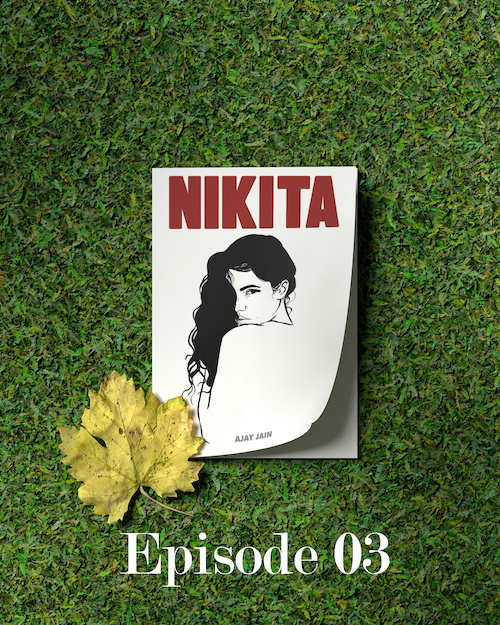
I don’t know what his siblings – and their respective families – had against my father, but it seemed they were out to suck his blood dry and destroy him in every way possible. Including the lives of his children.
My father had five brothers and two sisters. The position he held with the royal family should have gone to the eldest brother, Brajesh tauji. But he was too busy managing his wives and mistresses to be entrusted with any responsibility. Next was a sister, Sarla bua, who was not entitled to work. The third, Chand tauji, had some sense and studied medicine in Russia and settled there only. The baton was my father’s to drop, but he held on to it for dear life. He had grown up dreaming of this job but expected one of those in line before him would get it. But when destiny offered this gift, he gleefully accepted it.
My father’s parents lost their lives tragically about two years after the youngest of their children was born – they were on their way to Badrinath for a pilgrimage when their bus fell down the steep Himalayan slopes. All thirty four on board perished. The eldest of the siblings was expected to take charge of the family at the young age of twenty, but he was too caught up in his romantic liaisons to bother. The aunt had been married just a few months prior to the tragedy to a lawyer about twelve years older to her. He was struggling in his practice, and he found the perfect pretext to move into our house as the new father figure. My aunt was very docile, and took the task of managing the household upon herself. The husband, Mahesh uncle, went about unchallenged as he sold off properties to not just pay for household expenses but to also siphon off an undue share for himself. The jewels were saved because my great-grandmother was still around, and kept those close to her chest.
We also got by in those trying times because of the special status our family enjoyed in Jaipur as the confidants of the palace. We could raise unsecured loans with no questions asked, seek favours of any kind with the authorities, be assured of admissions to the best of schools and colleges, and get preference for jobs in the private and the government sector. But all these benefit those who can make good use of it. Doors may have been open for us, but it still required one to study and work hard. The royals themselves were generous enough with gifts and grants to our family, and became even more charitable after the death of my grandparents. But any good fortune squandered off provides little solace to its intended beneficiaries.
The four born after my father were all studies in contrast. Birju chacha, the uncle born after my father was a waster, a bully, a drunkard, a leech and a predator – yes, it’s possible for one to be all these and more. Harish chacha, the sixth child, got good guidance from a friend’s father, pursued law and moved to Delhi – he built a successful practice helping politicians legitimise their ill-gotten moneys and became fabulously wealthy himself. Rupa bua was born after him – no one bothered looking for a groom for her, and she became a bitter, abusive spinster. All of us kids would call her a witch behind her back and stayed clear of her; she would wallop us on a whim anytime, with or without reason. The youngest, Jagdeep chacha, caught the fancy of a rich Marwari family, the rich business community from the state, and married one of their daughters. The bargain required him to move to Mumbai, live with his in-laws, be employed in their garments factory, and not move anywhere from under the thumb of his dominating wife.
In this family was born Nikita.
*****
Our house was like a hammam of sorts. Everyone’s lives were bared for all to see; there were only feeble attempts to be discreet about one’s pleasures and displeasures. Illicit liaisons and abuse were rife, as were resultant outbursts and tears. Everyone knew what was happening, and yet no one talked about it. We hurt each other, and let wounds fester.
I was the youngest in the family, and was invisible to everyone. I was literally a fly on the wall, and on the floor, and behind doors, and even under the bed; even if others knew I was around, I would be disregarded as the kid who would not even comprehend what was going on. They were right. I did not, at that tender age. But the images stayed. For me to interpret later in life. We may have been a family of stature for the city, but we would have been condemned socially and legally had our admirers got to peek within.
The eldest, Brajesh tauji, turned out to be an inverted role model. He got married to Lata tai when he was 15 and she was all of seven. Of course, she did not move in with her husband until puberty but she always remained a child to him even after she did. Brajesh tauji did not desist from bringing his ‘girlfriends’ home. This was the normal tai got conditioned to since she was still at an impressionable age. No one read out her rights as a wife to her. She was made to wash and iron his clothes, serve him food, make his bed and even wait outside the bedroom when he was busy with a woman. The audacity of it all was laid bare when she was made to serve drinks to the visitor, and even clean up after she left. She did not know what sex was, and her husband couldn’t bear the thought of ‘educating’ her. Birju chacha took it upon himself to make her wise about worldly matters. For his own motives though.
One day, Brajesh tauji brought home a fair-skinned woman; she was clearly a foreigner. A coolie followed, lugging oversized suitcases and boxes. Tauji was beaming; he had the look of someone who had just won a world cup in polo, his favourite pastime and hunting ground for women. Without a word to any of us, he took the lady straight to his bedroom on the first floor. Curiosity took us all to the central courtyard, to look up and see what that was all about. Servants were continually going up and down, with the luggage first, then water, and then chai. After about an hour, we saw Lata tai coming down, with a servant carrying her personal effects behind her. She did not look towards any of us, save a couple of fleeting glances. Even in those briefest of moments, we could see the humiliation writ large on her face. But her eyes were not wet. They were seething. Rupa bua, the ‘witch’ muttered: Everything will be finished now. You wait and see. Never forget this moment when the downfall of our family started.
The child in tai was going to throw a tantrum. But she was no juvenile, not anymore. It was time to lay out the chess board. We would discover a crafty grandmaster in her, whose game would be played out over the coming generation. She would show us an art of war to make Sun Tzu proud.
You are reading the book Nikita in episodes. Click to read the previous episode / next episode.
